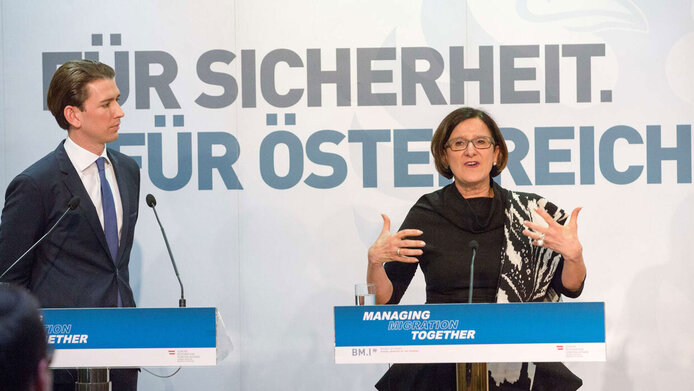Emotional politics

Sebastian Kurz, then Austrian Foreign Minister and now Federal Chancellor, had presented it as a great personal success. After more and more refugees from crisis and war zones started to arrive in Europe in the summer of 2015, Kurz announced the closure of the so-called Balkan route in the spring of 2016. In fact, Kurz had not been alone in achieving this result that was so effectively presented to the media, but it was accomplished in cooperation with the EU members and Balkan states along the route, despite criticism from the EU Commission, and with significant support from Slovenia. Actually, the process of “securing the borders” had already begun in the previous autumn and was initiated by Hungary’s Prime Minister Viktor Orbán.
Populists instrumentalise the refugee crisis
Since that time, the issue of migration has dominated political debates, and right wing populist parties in particular like to use it as a vehicle for advancing their core interests, such as nationalisation and authoritarianism and the associated division into “us” and “the others”. Even before 2015, in the 2014 European elections, conservatives, EU sceptics and populists had already chalked up significant gains, a trend that was re-confirmed in the 2019 elections. The EU member states Austria and Slovenia also saw a rise of right-wing conservative parties from 2015 onward. “Refugees fuelled populism in the two countries. This resulted in the public perception of refugees as dangerous, unable to integrate in cultural terms and a threat to national security and welfare systems,” says Birgit Sauer, a political scientist at the University of Vienna. In collaboration with researchers from the interdisciplinary Peace Institute in Ljubljana, Sauer is now exploring the connections between politics and the media against the backdrop of the 2015 refugee crisis. The teams in Slovenia and Austria are building on previous research that dealt with populism on the internet and in the media. Are there parallels between political strategies and framing by the media? And how does the general public react to the narratives accompanying refugee policy? – These are the central questions of this bilateral project, which is supported by the Austrian Science Fund FWF.
Emotional politics in the limelight of political parties
Researchers have been observing the erosion of traditional party democracies and the rise of a “right-wing populist democracy” for quite some time. Political leaders who increasingly chose to address people’s emotions were the enablers of this attrition of the foundations of democracy. Mobilising emotions is a core element of populist movements. “Populists aim at producing fear and insecurity, and people’s fear of social decline is transformed into anger against refugees,” explains principal investigator Sauer. Together with the sociologist Otto Penz and the doctoral student Daniel Thiele, Sauer has analysed, inter alia, parliamentary debates around the tightening of asylum laws that challenged EU regulations in both countries under study after 2015. Her initial findings show that arguments against those seeking protection in Austria did not only emanate from the Austrian Freedom Party (FPÖ), as one might assume, but were also found, for example, in the Alliance for the Future of Austria (BZÖ) and in the Austrian People’s Party (ÖVP). The issue of security – including the protection of women against violence – occupied first rank in the central narrative patterns. Priority was also given to arguments on identity issues (Western values vs. political Islam) and economic aspects such as the exploitation of the welfare state and the threats to the labour market.
Tabloids advance populism
The patterns of argumentation used in political debates and the generalisation of “the refugees” being a threat to the country are also found in the media. However, samples studied by the researchers show a differentiated picture, at least for Austria, and essentially reflect the Austrian media landscape from tabloids to quality newspapers and the public-service broadcaster (ORF). It turns out that the powerful tabloid sector not only readily adopts political positions uncritically, “but itself also generates populism”, as Otto Penz reports. The hypothesis of the research project that there is a parallelism between politics and the media has not, however, been confirmed for Austria. “The good news,” Birgit Sauer notes, “is that the media are not so easily forced into conformity, even in the face of the message control that became a common element under Sebastian Kurz. In Austria there is still the fourth power, although the powerful tabloid sector disseminates right-wing populist ‘framings’ and makes them mainstream in order to increase circulation.”
The researchers accordingly see the public-service media as an important counterweight acting as a controlling body. The example of Slovenia shows that more media in private hands also results in more uncritical reporting, according to the researchers. “In Slovenia, even in the quality sector, the parallelism between political and media populism is much more pronounced than in Austria,” Penz says.
The mobilisation of emotions
The project team is currently analysing survey data to determine how the public reacts to policy makers that focus on fuelling fear and insecurity. Other publications from the ongoing research are currently undergoing review. This type of new emotional politics has not yet been comprehensively investigated and the current research project aims to provide empirical foundations. “Right-wing populist parties recognised the emotional vacuum in politics even before the refugee crisis and propagated fear of ‘the others’ in tandem with taking care of ‘our own’. It can be observed to this day that right-wing populist narrative patterns are increasingly entering the mainstream and creating divisions in the public,” Sauer summarises.
In the meantime, preparations are being made at Europe’s external borders for a new increase in the number of refugees. Noisy sonic cannons, drones and armoured vehicles are the answers of European migration policy six years after the great “refugee crisis”. In any case, the closure of the Balkan route has failed to achieve its goal and there is still no indication of a solidarity-based refugee policy that respects the fundamental rights of migrants.
Personal details
Birgit Sauer is a political scientist and professor at the University of Vienna. One focus area of her research is gender studies in political science, and she is also engaged in research on politics and emotions, right-wing populism, and theories of the state and institutions. The transnational basic research project “Political and media populism: the ‘refugee crisis’“ (2019-2022) is being funded by the Austrian Science Fund FWF with EUR 275,000.





